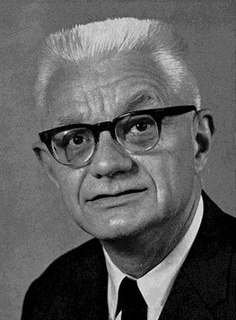A Quote by David E. Cooper
It's one thing to assent to propositions like 'The way of things is ineffable', and quite another to internalise what it is being gestured at by such propositions, to get a sense or feel for mystery. For me, at least, it is in and through ways of engaging with nature that this sense is intimated. These ways include being in the garden.
Related Quotes
The axioms of physics translate the laws of ethics. Thus, "the whole is greater than its part;" "reaction is equal to action;" "the smallest weight may be made to lift the greatest, the difference of weight being compensated by time;" and many the like propositions, which have an ethical as well as physical sense. These propositions have a much more extensive and universal sense when applied to human life, than when confined to technical use.
There are different interpretations of the problem of universals. I understand it as the problem of giving the truthmakers of propositions to the effect that a certain particular is such and such, e.g. propositions like 'this rose is red'. Others have interpreted it as a problem about the ontological commitments of such propositions or a problem about what those propositions mean.
I suppose authoritarians don't like being made fun of because authoritarian rulers have a very inflated sense of themselves and don't like being deflated, which makes it all the more important to continue to deflate them. These are very courageous people around the world who poke fun from inside these societies. So, we now have to broaden the definition of what we mean by "writer" to include bloggers, cartoonists, song writers, visual artists - all these people are, in different ways, quite brave.
Life consists Of propositions about life. The human Revery is a solitude in which We compose these propositions, torn by dreams, By the terrible incantations of defeats And by the fear that the defeats and the dreams are one. The whole race is a poet that writes down The eccentric propositions of its fate.
To make our position clearer, we may formulate it in another way. Let us call a proposition which records an actual or possible observation an experiential proposition. Then we may say that it is the mark of a genuine factual proposition, not that it should be equivalent to an experiential proposition, or any finite number of experiential propositions, but simply that some experiential propositions can be deduced from it in conjunction with certain other premises without being deducible from those other premises alone.
Always get to the set or the location early, so that you can be all alone and draw your inspiration for the blocking and the setups in private and quiet. In one sense, it's about protecting yourself; in another sense, it's about always being open to surprise, even from the set, because there may be some detail that you hadn't noticed. I think this is crucial. There are many pictures that seem good in so many ways except one: They lack a sense of surprise, they've never left the page.
The propositions of mathematics have, therefore, the same unquestionable certainty which is typical of such propositions as "All bachelors are unmarried," but they also share the complete lack of empirical content which is associated with that certainty: The propositions of mathematics are devoid of all factual content; they convey no information whatever on any empirical subject matter.
It's the balance I'm trying to find - not being disconnected but giving myself some space to be in my world. I feel like I'm surrounded by friends of mine who are very different from one another but all care about similar things. We talk about this a lot, and I think that's probably the main thing - being surrounded by good people is the best way to stay in a solid head space. You want to be able to talk about these things, and be able to think things through and feel things through. That's helpful for me.
Mathematics is a logical method. . . . Mathematical propositions express no thoughts. In life it is never a mathematical proposition which we need, but we use mathematical propositions only in order to infer from propositions which do not belong to mathematics to others which equally do not belong to mathematics.



































